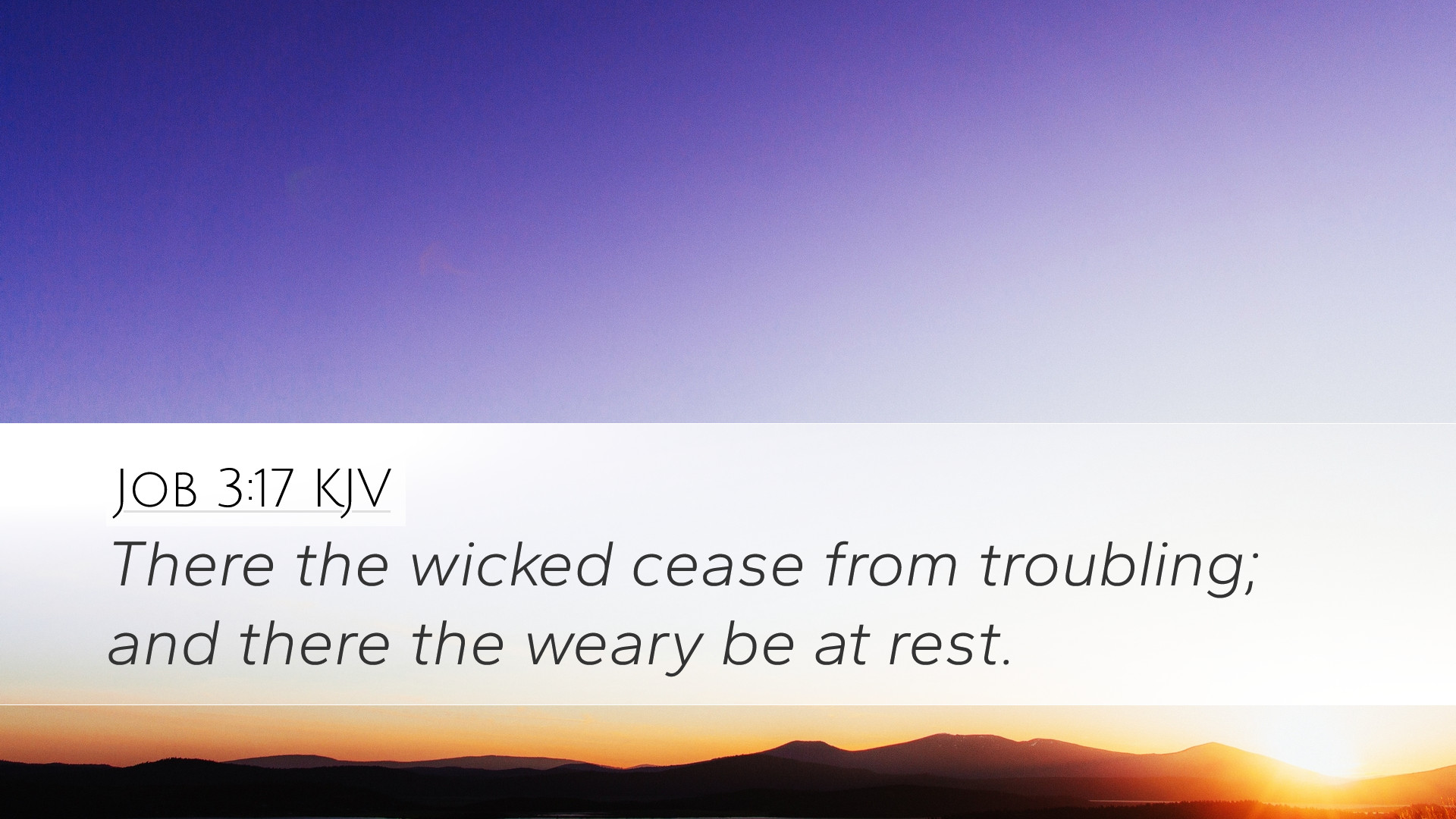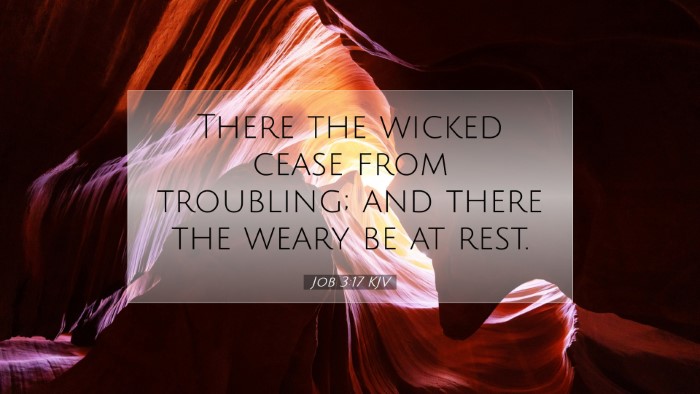Old Testament
Genesis Exodus Leviticus Numbers Deuteronomy Joshua Judges Ruth 1 Samuel 2 Samuel 1 Kings 2 Kings 1 Chronicles 2 Chronicles Ezra Nehemiah Esther Job Psalms Proverbs Ecclesiastes Song of Solomon Isaiah Jeremiah Lamentations Ezekiel Daniel Hosea Joel Amos Obadiah Jonah Micah Nahum Habakkuk Zephaniah Haggai Zechariah MalachiJob 3:17
Job 3:17 KJV
There the wicked cease from troubling; and there the weary be at rest.
Job 3:17 Bible Commentary
Commentary on Job 3:17
Job 3:17 (KJV): "There the wicked cease from troubling; and there the weary be at rest."
General Overview
This verse appears in the poignant lament of Job, where he expresses his deep sorrow after experiencing profound loss and anguish. The tone is one of yearning for peace and relief from his suffering. Job contemplates death as a release from the turmoil he endures. The implications of his words open up significant theological reflections on suffering, justice, and the afterlife.
Insights from Matthew Henry
Matthew Henry, in his classic commentary, underscores the contrast between the conditions of the wicked and the weary. He comments on the universal desire for rest and peace in the face of life's burdens. Henry points out that Job's lament reflects a common human longing, especially in times of despair.
- The Wicked’s Ceasing: Job highlights that in death, the wicked cease from their troubles. It suggests that in the grave, there is an end to their oppressive actions, and their power to trouble others is completely eradicated.
- The Weary at Rest: There is a profound solace in the notion that the weary find rest in death. This encourages deep contemplations about the nature of suffering during life and the peace that follows death for those who endure hardship.
Reflections from Albert Barnes
Albert Barnes offers additional insights into the significance of Job's words. He emphasizes that the statement reveals Job's understanding of the finality of death and the hope for a cessation of suffering.
- The Assurance of Rest: Barnes correlates the concept of rest mentioned in this verse with a theological belief in a state of tranquility that follows death for those who have suffered. He argues that Job is expressing a desire for relief from his intense afflictions, and he meditates upon death as the ultimate escape.
- Philosophical Implications: Barnes draws attention to the philosophical perspective on existence, suggesting that the verse implies a deep awareness of the transient nature of life and human suffering.
Analysis by Adam Clarke
Adam Clarke's commentary provides a detailed analysis of the emotional and spiritual dimensions of this verse. He elaborates on Job's mental state, emphasizing the desperate yearning for peace that characterize these lines.
- Psycho-Spiritual Reflection: Clarke indicates that Job’s wish for the cessation of sorrow is not merely a desire for death but a profound insight into the nature of human existence where peace is often elusive.
- Justice and Suffering: Clarke discusses how the lament reflects the human concern with divine justice. Job's contemplation can be seen as questioning why the wicked thrive while the righteous suffer.
Theological Implications
The reflections on Job 3:17, as drawn from the insights of these commentators, pave the way for deeper theological discussions:
- Understanding Suffering: This verse serves as a lens through which one can examine the problem of evil and suffering in the world. It questions the reasons behind human suffering and the divine justice system.
- Hope in Suffering: The statement gives a glimmer of hope that suffering is not eternal and that there exists a state of peace beyond this life, which can be reassuring for believers in times of distress.
- Mortality and Eternity: The verse invites reflection on mortality, invoking discussions on the nature of the afterlife and the conditions that await the faithful versus those who have acted unjustly.
Conclusion
Job 3:17 serves as an essential contemplation on the themes of suffering, rest, and justice. It encapsulates the despair of human existence and the yearning for peace that resonates with many believers and scholars alike. Through the perspectives of Matthew Henry, Albert Barnes, and Adam Clarke, we find a rich tapestry of thought that encourages further reflection on the divine, human suffering, and the hope that pervades even in the darkest moments.


